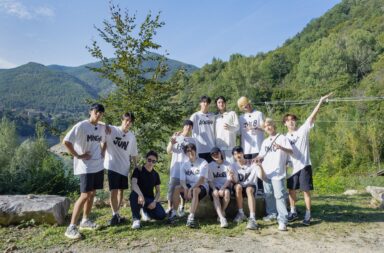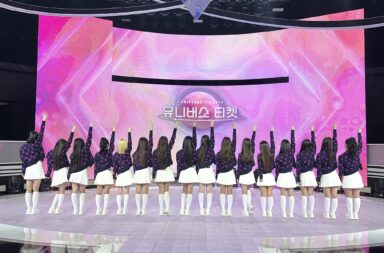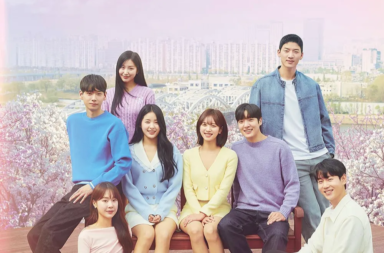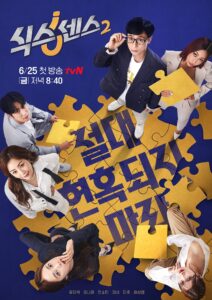
The first season of Sixth Sense was a huge success mostly due to the cast’s dynamics and the show’s unique idea. But, with such high expectations, the show sets itself up for disappointment in its successive season. Simply put, it started off on a high note but ended off on a low note. While it was initially exciting, this excitement soon wears off when the season is unable to neither maintain nor exceed expectations. In fact, the concept it is known for quickly turns stale and falls flat. Eventually, exposing its weakness: this very concept lacks longevity.
On the bright side, this season marks the addition of Lee Sang-yeob, who was one of the more prominent guests in the first season. Though he blended in well as a guest, he’s quite the opposite as a permanent cast. Unfortunately, he’s often too passive and takes on a “punching bag” role, waiting for someone to “attack” him for him to even be visible. Some 14 episodes have passed and his role is still up in the air while the other members have long solidified their roles. (Understandably, Sang-yeob is a new member, but my point still stands.)
There’s Yoo Jae-suk who cares for the guests and reacts to the cast’s playful jabs. There’s Jeon So-min and Mijoo who “drool” over the male guests. So-min sometimes switches things up to become “bros” with the guest if she knows them, like Ha Seok-jin and Ji Seok-jin. Jessi is still the Jessi everyone knows—she teases Jae-suk, cracks adult jokes, and sticks to her usual no filter approach. And Oh Na-ra tries her best to deduce the fake every episode, the only one who sticks closely to the main purpose of the show.
In comes Sang-yeob. Where does he stand? He’s not particularly close to guests unless he’s friends with them (like Lee Sang-yi). He’s easily overshadowed by the sharp-tongued members and fades to the background because of this.
But thankfully, not all is unfortunate with Sang-yeob. Avid viewers like myself still like him on the show. It was enjoyable when the cast teased him at the beginning of the season though they clamped down on it before creating his love line with Jessi. Arguably, the Jessi-Sang-yeob love line is one of the show’s rare funny moments and this might be his saving grace. Knowing that Sang-yeob has the potential to be funny, here’s to hoping that he grows less hesitant in the next season.
As a whole, the cast is less of a problem. They react well when they are introduced to new ideas. A prime example is in episode four, where the cast consults unique fortune-tellers as opposed to the usual food concepts. As the season goes, it becomes increasingly obvious when the cast enjoys the concept. They generally show bigger and more genuine reactions.

That being said, one of the show’s major issues is its guests. While in season one, the cast’s seamless chemistry stood out, in season two, it dies down. This becomes highly dependent on the guest’s willingness to interact with the cast and let loose. Sure, So-min and Mijoo are active in playing the role of easily love-stricken young women. But most guests don’t know how to react to their goofiness, which quickly flattens this potentially comedic moment.
The show’s choice of guests is shrouded in mystery. While guests typically spice up the show, those on Sixth Sense mainly share two common traits: shyness and being variety rookies. Their decision to cast shy guests only serves to disrupt the flow of the show, which becomes counterproductive to Sixth Sense’s biggest selling point: its cast chemistry.
Guests who do well (namely Ahn Bo-hyun, Ji Seok-jin, Jo Se-ho, Ha Seok-jin) are ones who are either not shy, know at least a cast member, and/or are variety veterans. They are the ones who can handle the cast’s energy and are not afraid to bicker with them. While less enjoyable guests either easily fade to the background, only talk among themselves, and only talk when asked, which decreases the show’s entertainment value.

The stakes are always high when stepping into a new season. And for a show that is heavily dependent on its concept, it is highly susceptible to becoming repetitive. The very concept that initially pulled viewers in backfires when they overuse its concepts and logic. It is overused to the point where my finger would not leave the fast forward button as if I knew what the cast is going to say.
Barely halfway through the season, one may realise that the cast points out the same few things with their overused comments and logic: “The production crew purposely made the props and place look old”, “The dirt on the wall can definitely be made”, “Isn’t this place too perfect looking?”. Coupled with its excessive use of editing, it renders this season increasingly lacklustre.
While the cast’s comments are warranted (as it is their job to give a reaction), its editing chooses to focus on minuscule aspects of their comments regarding the participants’ mannerisms or words. In most episodes, comments like, “He stuttered”, “He seems nervous”, “He looks as if he forgot his script”, are heavily highlighted through its editing. It appears as if the show compensates for its lack of exciting moments by exaggerating their comments in post-production. Again, this is less of a cast issue. Instead, this failure reflects the staff’s inability to surpass their previous works, causing the cast to react in a similarly each time.
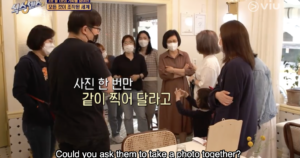
At other times, the staff unnecessarily go out of the way to trick the cast, though I know that this is exactly the point of the show. But hear me out. They do so with what I would call “cheap tricks”. Minor “tricks” or “lies” that are needlessly confusing, yet the staff makes the cast pay attention to them.
In episode two, a restaurant serving French-Korean fusion cuisine coupled with a dine alone concept was featured. The “owners” are a French-Korean “couple” who was the fake of the episode. Upon first look, everything looks unassuming. But to further fool the cast, the staff went as far as to bring in their “daughter” and her “grandmother” to ask for a photo after they were done filming. While some may argue that it is these details that matter, I think it would have been better if they redirected their creative energy elsewhere than to rely on these cheap tricks.
To put it bluntly, while it worked for the cast, it did not work for viewers. If this were a real-life guessing game that viewers could participate in, we could have been fooled by the involvement of these secondary actors. But viewers are far from that. Though we find joy in watching celebrities weed out the fake locations, the show disregards the viewers’ position as a non-interactive and physically absent “player” in this equation. It is normal for celebrities who get asked for pictures all the time. But for them to paint it as out of the ordinary is quite a stretch.
But of course, the show still deserves a pat on the back for its (slight) creative experimentation. While the previous season focused on food, this season saw the birth of new ideas and mini-games to win clues. Namely, a new concept, fortune-telling, was introduced and it was a personal favourite. Likewise, they were experimental in their last episode when they combined three different themes (food, people, and art).
This season also marks Mijoo’s growth as a variety star as she proves her willingness to shatter her pretty idol image. Mijoo does so well that she is even acknowledged by Jae-suk, who jokingly dubs her as an “idol-turned-comedienne”.
By the end of this season, it is easy to forget what Sixth Sense is all about. It is a huge mish-mash of concepts, cheap tricks, and awkward guests, with the last episode being the most unsatisfying one. Personally, the show has more downs than ups. Not one episode blew my mind while a handful did in season one. For most parts, this season was a blur with episodes constantly conflating as they feel repetitive.
Sixth Sense’s concept is getting dull. Though the staff appear to be experimenting on many things, they can’t seem to solidify their strength. As this season saw almost twice the number of episodes, it seems like the show has bitten off more than they could chew and have hit a creative block. With the final one being a big question mark, Sixth Sense is in dire need of a switch-up.

